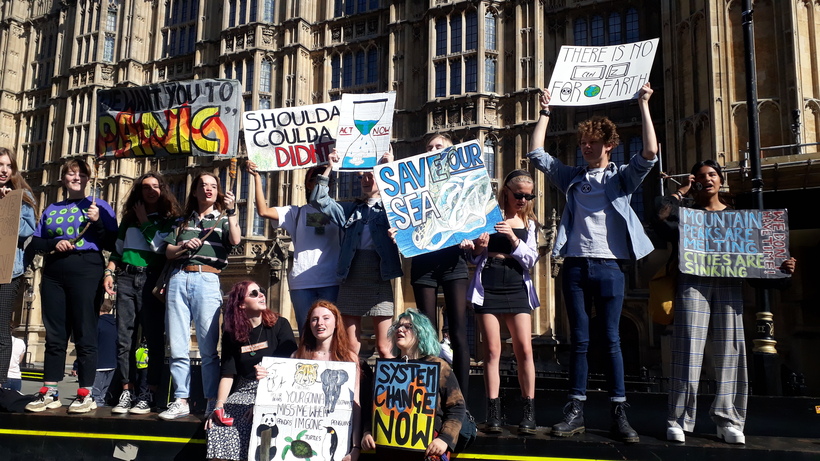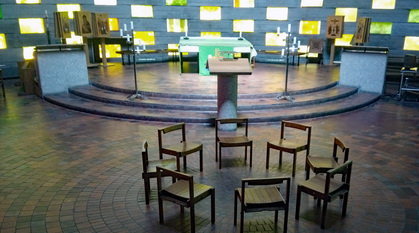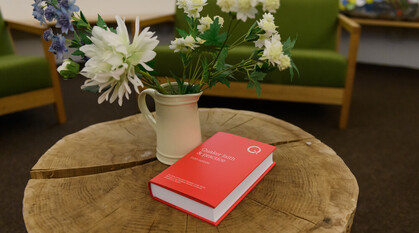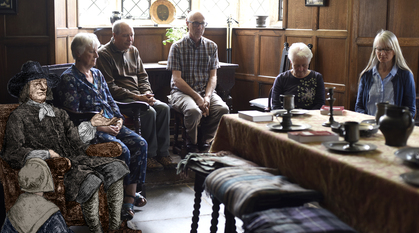It’s time for schools to teach the climate and ecological crisis
The Youth 4 Climate school strikers are calling for a better education. Olivia Hanks looks at their important new campaign Teach the Future.

Strange but true: today's UK school system prepares pupils for a future that simply does not exist. This extraordinary failing has led young people to self-organise and demand school-based education that acknowledges and responds to the defining challenge of their lives: the climate crisis.
Anya, 18, is a London-based Quaker who is studying for A-levels and has taken on an active role in the youth climate strikes. “My Geography course does cover quite a bit on climate change and humans' impact on the planet," she says, “but I've waited 12 academic years to get to this point, and a lot of students still won't be taught about it if they don't study geography.
“Even now it's not taught as if it's an emergency, but instead just as something that's occurring. This is the future we are going to be living and we deserve to be made aware and prepared for it. Many of my friends barely even know that climate change is happening."
Calling for ecological education
To support the young people calling for an education that prepares them for climate breakdown and a post-fossil fuel age, Quakers in Britain has signed up to a new youth-led campaign, Teach the Future, which aims to repurpose the education system around the climate and ecological crisis.
A joint initiative by the UK Student Climate Network (UKSCN) and Students Organising for Sustainability (SOS-UK), the campaign calls for a review of how the formal education system in England is preparing students for the climate and ecological crisis. Teach the Future focuses on a Climate Emergency Education Act, and an endowment fund for youth-led climate action.
The campaign points out that climate is currently confined to science and geography lessons. Pupils get very limited outdoor education, and there is no recognition of the practical skills and training that are needed for the zero-carbon transition. Education is not equipping young people with the emotional resilience they need in an age of climate breakdown. Learning about sustainability should develop through a child's education, but right now, there is no established pathway for this.
Supporting the strikers
Backing Teach the Future is a natural step for Quakers in Britain, bringing together our work on climate justice and our work on peace education in schools. We support the youth climate strikes, with staff joining the global strike in September 2019; in the spring we welcomed Greta Thunberg and UKSCN to Friends House. We are keen to offer more support to young climate activists, and are running a workshop for climate strikers in Manchester at the end of February.
With our partners in the Peace Education Network, we are working to include climate justice in peace education resources. We want to support others to explore the common roots of armed conflict and environmental destruction, and develop an understanding that building peace and building a sustainable world are the same project.
[QUOTE-START]
“I feel peace education is about teaching children to discover that they have the power to change things they see are wrong and developing the imagination to find alternative responses to conflict."
- Janet Gilbraith, Quaker faith & practice 23.85, 1986
[QUOTE-END]
Teaching the climate crisis is an essential part of facing up to reality, but it does not mean simply frightening children with visions of apocalypse. We might take our cue from a contribution from Janet Gilbraith to Quaker faith & practice (23.85, 1986), which begins with these words: “I feel peace education is about teaching children to discover that they have the power to change things they see are wrong and developing the imagination to find alternative responses to conflict."
If young people are to find ways to build a sustainable and peaceful world, they need to hear the difficult truth; they need practical skills; but they also need imagination and hope.
Repurposing the curriculum around the climate and ecological crisis will mean making space for imagination and creativity, fostering that extraordinary human gift of imagining things otherwise than they are. It will mean supporting young people's activism and listening to what they say, building their confidence that their action has meaning and power. Hope springs from action, as Quakers have learned from long experience.
It was recently reported that headteachers and psychotherapists have seen improvements in mental health among young people involved in climate action. The school strikers' activism is good for them and good for all of us. Policymakers must now ensure that it bears fruit.


